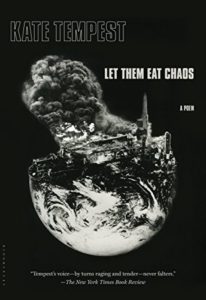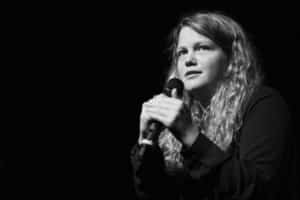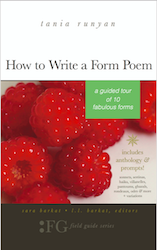Reading Kate Tempest
Let Them Eat Chaos by British poet Kate Tempest includes a note at the beginning: “This poem was written to be read aloud.” And you think, “Well, aren’t most poems meant to be read aloud?” Perhaps, but Tempest is making at least three points with that statement.
First, reading a poem aloud is not a given; most poems are read silently today, as opposed to being read aloud. Reading aloud assumes (or presumes) an audience.
Second, this single collection-length poem was written specifically with the idea of being read aloud.
And third, reading aloud is a performance, which is exactly what you would expect from a poet who is also a playwright, and also a recorder of CDs (including rap). In fact, Let Them Eat Chaos is paired with an audio CD of the same name.
Tempest doesn’t blur the lines between artistic forms; she blows them up.
Let Them Eat Chaos is a single long poem about seven Londoners living on the same street. They don’t know each other; their lives never intersect. They have much in common, but they will never know that. Instead, they move about their atomized lives, unaware of each other, and often unaware about what matters most in their lives.
Tempest presents contemporary life in London as almost random, and often pointless.
Excerpt from Let Them Eat Chaos

there’s a million epiphanies occurring,
in the blurring of the world beyond the curtain
and the world within the person
There’s a quivering.
The litter in the alleyway is singing.
People meet by chance, fall in love, drift apart again.
Underage drinkers walk the park and watch the dark descend.
The workers watch the clocks, fiddle with their Parker pens
While the grandmothers haggle with the market men.
Here, where the kids play and laugh until they fall apart,
it’s kiss-chase and dancing
till it’s mistakes and darkened rooms.
Too fast too soon
too slow too long
We move around all day
but can’t
move
on
Is anybody else awake?
Will it ever be day again?

Kate Tempest
Tempest is the author of two plays, Wasted (2013) and Hopelessly Devoted (2014); two poetry collections, Hold Your Own (2015) and Let Them Eat Chaos; and a novel, The Bricks That Built the Houses (2016). She won the Poetry Society’s Ted Hughes Award for innovation in poetry for 2012. The award was given for her play Brand New Ancients, which the award judges called “a poem standing up.”
Always jarring, without a fixed point except for a rather drifting aimlessness, Let Them Eat Chaos blends poetry and performance into something that is simultaneously disconcerting and fascinating. It’s like watching a familiar building burning.
Related:
The Guardian’s review of Let Them Eat Chaos
“Kate Tempest’s poetry is simply no good” by The Spectator
“Kate Tempest’s Transformations” by The New Yorker
Album trailer for Let Them Eat Chaos
Photo by Ethan M. Long, Creative Commons, via Flickr. Post by Glynn Young, author of the novels Dancing Priest and A Light Shining, and Poetry at Work.
- 10 Great Resources for Teaching the Civil War - March 6, 2025
- Relearning Civil War History to Write a Novel - March 4, 2025
- Poets and Poems: Marjorie Maddox and “Seeing Things” - February 27, 2025



L.L. Barkat says
I’m thinking that more poetry should be written with the idea it’ll be read aloud (though the style could even be formal, like Shakespeare, which I might prefer.)
Did you like the poem? (Or maybe I should ask if you liked the performance? 😉 )
Glynn says
I did like the poem. But it is a book-length work, and Ibwonder how it would work in a full reading or performance, given our attention spans.
Bethany R. says
I love that she specifically puts in black and white that is should be read aloud.
It also makes me think, what kind of poems (if any) are enhanced by being read silently?
Glynn says
I’m not exactly sure. I have this idea running through my head that all poetry should be written to be read aloud.
Maureen says
Kate Tempest is great. I’ve featured her on my blog.
Bethany R. says
“Let Them Eat Chaos blends poetry and performance into something that is simultaneously disconcerting and fascinating. It’s like watching a familiar building burning.”
What a unique poem and format—it’s be interesting to hear that CD.
Maureen says
I don’t necessarily think a book-length poem takes it out of the running for a performance, precisely because it would be performance. And that performance could be enhanced in the same way Sondheim brought this life that great painting ‘La Grande Jatte’ (George Seurat).
I’d love to see a similar treatment by Tempest.
Maureen says
On reading aloud v silently: I might challenge the notion that most poetry today is written to be read silently. Every poet I know “reads aloud” in her head if not also out loud; if we don’t, we deprive ourselves of knowing whether a poem’s sonic qualities and rhythms are hitting the mark. I don’t know how many readings take place in the U.S. each year but the number, given my constant searches of them, the number has to be considerable. I also take into account all the recordings that are available (including those from long ago) as well as videopoetry, which has really come into its own these days and often includes both voice and screen text. And ours is an aural culture; the poetry out loud events for youths take place everywhere. And I think people have a real appreciation for the spoken word today (I’m including rap, too).
For me, reading silently and reading aloud offer two different experiences, and the latter can be transformative. Reading a poem aloud brings its sound alive; sometimes, or perhaps more often, enhances understanding, by for example, helping the listener to “feel” the accent or where a line is emphasized. And thinking of children’s books, especially children’s poetry books, I’d say their contents definitely are written to be read aloud.
A poor reader, of course, can leave a listener wanting to run from the room.
Bethany R. says
I too take in a poem differently when read silently or aloud. I’ve always thought of a poetry reading as the ultimate way to fully experience a piece. It’s fascinating to hear where the poet puts the emphasis in their delivery, like Maureen mentioned.
When I’m attempting to write one, I’m contantly scratching down a few words, reading outloud, crossing our a few words, reading outloud… until I have it right where I want it.
But I just got to thinking, there is some poetry that I would almost prefer to whisper, (if I read it outloud at all). Some poems are like a secret, and the intimacy of reading them silently might be a fitting way for me to take them in.